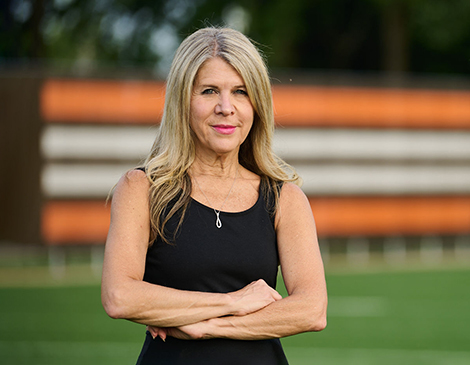Four or five days a week, Mary Kay Cabot leaves her Rocky River home for an hour-long walk with a constant companion.
Not a beloved pet, but a laptop computer in a drawstring bag on her back.
Plenty of times, the Browns beat writer for Cleveland.com has perched on a neighbor’s porch or a park bench to bang out a breaking news story. When she goes to dinner with her husband of 32 years, Bill Murman, she might say, “Should I bring the laptop?” and he is trained to say yes, even if their destination is Vermilion’s elegant Chez Francois.
Cabot began covering the Browns for the Plain Dealer in 1988 and took over the beat in 1991. Raising three children with Murman, she learned to juggle football and family, attending “mom prom” with their eldest, Chris, when “Johnny Manziel is floating on a swan and I have to deal with it.” That escapade, days before mandatory minicamp, gave a hint of the trouble ahead with the immature rookie quarterback.
Known around the country as a relentless newshound, Cabot was selected as the 57th recipient — and only the second woman — of the Bill Nunn Jr. Award, given by the Professional Football Writers of America to a reporter who has made a long and distinguished contribution through coverage. The Lakewood native and 1984 graduate of Kent State University will be honored by the Pro Football Hall of Fame at the enshrinees’ Gold Jacket Dinner on August 1.
“I always loved the breaking news. I consider myself an old school, bulldog type of reporter,” Cabot says. “I’m bulldoggy.”
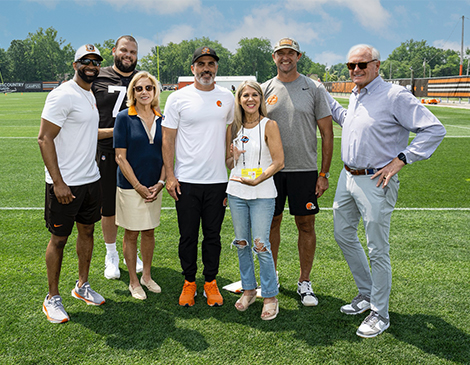
She believes her crowning achievement is a series of stories in 2011 after quarterback Colt McCoy returned to action with an undiagnosed concussion. Receiving a tip the next day that McCoy was getting checked at the hospital, she reached McCoy’s father, Brad. In response, the NFL placed independent, certified athletic trainers in press boxes and implemented a video system, thereby accelerating the development of the league’s concussion protocol.
Her coverage incensed the then-Browns' front office.
“Even though it was painful to get to that point in a lot of ways, I feel like it did a lot of good and it may have saved a bunch of lives,” Cabot says. “Would we even have this concussion protocol if that didn't happen with Colt McCoy? It could have been years. It needed something that big and cataclysmic to effect that change.”
Cabot knows that controversy showed how she’s wired, but her favorite stories are more personal.
RELATED: Pro Football Hall of Fame Honors Mary Kay Cabot of Cleveland.com
She mentions an interview with Trent Dilfer, whose 5-year-old son Trevin died of a heart virus in 2003, that drew tears from her and the quarterback.
She brings up linebacker Jamie Collins, whose parents died before he turned 6, forcing his sister Lisa to raise five boys. Collins learned how a father talked to his son by listening to customers in a grocery store.
“I couldn't believe he shared his heart and his story with me like that. He'd never done it before then, and he’s never done it since,” Cabot says. “I don't know what it was … I think it's because I have such maternal instincts.”
She adds receiver Jerry Jeudy talking about his sister Aaliyah, who lived to age 7 with chromosomal disorder Trisomy 18, receiver Michael Woods II revealing he nearly drowned in his family’s pool at age 4, cornerback Martin Emerson Jr. speaking about his mother going into prison just as his father was released, and Joe and Annie Thomas reliving how they met.
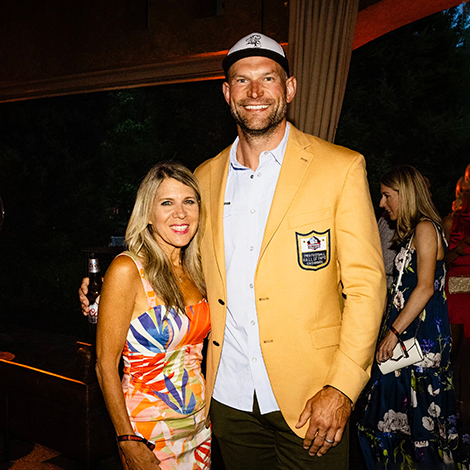
Among Cabot’s most cherished features is cornerback Denzel Ward discussing the death of his father, Paul Ward Jr., at age 46. The intermediate school principal suffered sudden cardiac arrest during a spin class after his son, a Nordonia High School graduate, finished his freshman year at Ohio State University. She told Ward about her husband’s aortic valve replacement surgery that Murman will need again.
“I had to sit in the waiting room at the Clinic with a little black box in my hand,” Cabot says, thinking back 14 years. “When they take the heart out of the body to work on it, there’s a green light that goes on while your loved one is on life support. I was by myself. My three kids were at school.
“Denzel could relate to me about that. He (said) he went into this deep, dark place when he went back to school. He was taking his anger out on the field. I asked him, ‘How long did that dark cloud stay with you?’ and he said the whole time at Ohio State. He said coming here was when the real healing started.”
Conversations with her children can be just as deep. Chris, 28, works as an accountant at a Northeast Ohio firm. Celeste, 26, is a professional acrobat working in multiple groups, including a Cirque du Soleil-type troupe based in Canada. Camryn, 24, a marketing professional in New York, is trying her hand at stand-up comedy.
“Our girls talk to Mary Kay every day and sometimes two or three times a day,” Murman says. “Add that to all the other responsibilities Mary Kay has. Our children lean on her a lot.”
Owner Art Modell’s moving of the Browns to Baltimore after the 1995 season helped the Murmans start their family. Chris arrived in August 1996, Celeste in September 1998, Camryn in October 2000. Cabot took a year off with the first two and the rest of the year with Camryn.
“I always say, ‘I wasn’t productive during those years, but I was reproductive,’” Cabot says.
“My kids knew that I was going to be there for them and fight for them and do whatever I could for them. But they also knew I had to run out to the car real quick and write the Gerard Warren story.”
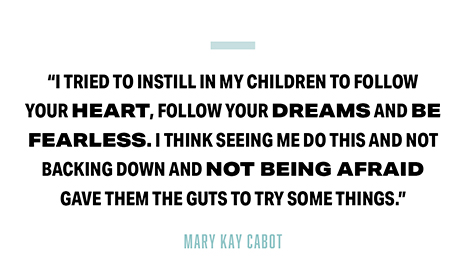
While she worked, Cabot’s mother helped with household chores. When Cabot was on the road, Murman took the kids to church, then to McDonald’s Playland so he could read the Sunday paper.
“As they got involved in a lot of different activities … if she couldn’t be there, she made sure I had what I needed to get them where they needed to be,” Murman says. “People would joke, ‘How did you do all that when she was gone all the time?’ Mary Kay literally left me a sheet for the weekend.”
In 2001, Cabot was offered an all-sports position at ESPN. She said a female counterpart there considered Cabot’s family, including 8-month-old Camryn, and said, “‘You’d be nuts to think you’ll be able to do this. It would be crazy.’”
A financial advisor who has been with UBS Wealth Management for the last 25 years, Murman gave his blessing, anyway.
“The discussion was something like 200 days a year on the road,” Murman says. “You could get a phone call and be expected to be in Kentucky or California. You could be covering women's lacrosse or issues, that’s how you cut your teeth. At the time, I was in the merger-and-acquisition world, and I was traveling. I said, ‘We can make this work.’
“She came to the conclusion she didn't want her children to be raised that way.”
Now, with her name engraved on a plaque in Canton, Cabot sees positives in how her career influenced her family.
“The kids became very independent,” she says. “Now they’ll go travel the world.
“I tried to instill in my children to follow your heart, follow your dreams and be fearless. I think seeing me do this and not backing down and not being afraid gave them the guts to try some things.”
For Cabot, that included moving to the Browns beat at the Plain Dealer after three seasons covering the Cleveland Force professional soccer team. She was thrown into the fire in coach Bill Belichick’s first year.
“I was completely intimidated by the whole experience,” Cabot says. “All eyes were on me. It was a challenge trying to figure out how to get Bill Belichick to answer a question. Players could be really, really difficult if they weren’t ready to accept you into the club. I was replacing someone who had been on the beat for a long time.
“I just kept on telling myself, ‘I can do this, I’ve got this.’ There were a lot of battle scars that came from that year. Even though there have been many things that have been very, very difficult, nothing was that hard again.”
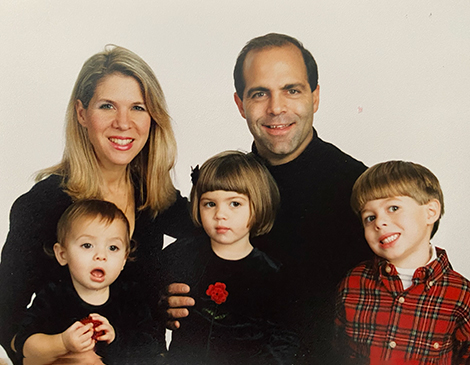
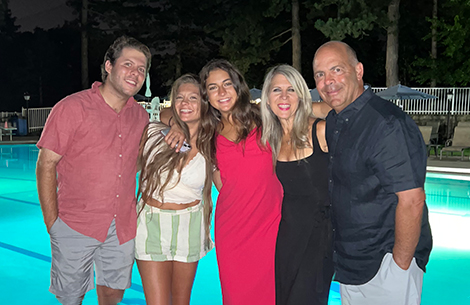
Her “insanity beat” still brings constant stress. Since 1991, the Browns have had 13 coaches (including interims), surpassing their nine from 1946-1990. There have been 40 starting quarterbacks since 1999, but that madness began in 1993, when Belichick benched and cut beloved quarterback Bernie Kosar in favor of the unproven Vinny Testaverde.
“To this day, when (Belichick) brought us into that press conference room to announce he was benching Bernie Kosar, he says I slammed my notebook down, and he knew how this was going to go,” she says. “I do not remember doing that.
“Quarterback controversies and GM controversies … then you move into ‘The Juvenile Js,’ Josh Gordon and Johnny Manziel and Justin Gilbert. These were not normal times to be covering a football team.”
Journalists like Cabot received phone calls from Belichick complaining about stories. Asked the second-most difficult coach she’s covered, Cabot picked one-and-done Freddie Kitchens in 2019.
“Freddie got mad at me for something and he wouldn't give me an opportunity to resolve the situation, so we were at odds after that,” Cabot says. “There were others who were difficult.”
Being one of the few women covering an NFL team also provided obstacles in terms of acceptance, harassment and bullying, with Cabot sometimes relying on a player to police the locker room.
“There were times I thought, ‘I can’t do this,’” she said. “Then you go home and cry into your pillow and you get back up and you do it again the next day. You had to be built tough to do this job.”
Those who have watched her transition to a 24/7 news cycle that includes podcasts, videos and newsletters believe the PFWA award is well deserved.
“She’s been as dependable for me as a source in the NFL as anyone I’ve ever come across in the league,” says Jim Nantz, the voice of CBS Sports and its lead NFL play-by-play announcer since 2004. “When I see Mary Kay’s byline on a story, I’m going to open it and read it every time without fail because I’ve always considered her to be elite and one of the best to ever cover the game.”
“I think I can speak for a lot of the players who have worked with MK … the great work she’s done,” says Hall of Fame left tackle Thomas, who played for the Browns from 2007-2017. “Especially when you’re covering a team that’s not had a lot of success and you have to be the bad guy in the locker room asking the tough questions. She’s always done it with grace and professionalism.”
Cabot continues to ask tough questions. Co-workers wonder if she sleeps; she says she gets about six hours a night.
She knows she couldn’t do it without the “most supportive husband in the world” in the face of continuing criticism — what she calls “smoke” — from social media, blogs and players’ handlers.
“I've been shut down about this and I've been yelled at about that and I've been bullied about that, and I walk through the door and Bill says, ‘I’ve got some meatballs for you over there on the counter,’” Cabot says.
“Then he’ll say, ‘Don’t take it personally. Do your job the way you need to do your job.’ He talks me off the ledge. I’m always on the ledge. But I’m not afraid of the smoke.”
For more updates about Cleveland, sign up for our Cleveland Magazine Daily newsletter, delivered to your inbox six times a week.
Cleveland Magazine is also available in print, publishing 12 times a year with immersive features, helpful guides and beautiful photography and design.

